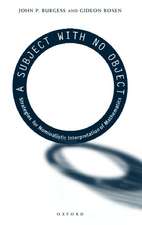Scepticism and Reliable Belief
Autor José L. Zalabardoen Limba Engleză Hardback – 26 iul 2012
Preț: 557.45 lei
Preț vechi: 711.60 lei
-22% Nou
Puncte Express: 836
Preț estimativ în valută:
106.68€ • 115.84$ • 89.61£
106.68€ • 115.84$ • 89.61£
Carte tipărită la comandă
Livrare economică 11-17 aprilie
Preluare comenzi: 021 569.72.76
Specificații
ISBN-13: 9780199656073
ISBN-10: 019965607X
Pagini: 228
Dimensiuni: 164 x 241 x 21 mm
Greutate: 0.52 kg
Editura: OUP OXFORD
Colecția OUP Oxford
Locul publicării:Oxford, United Kingdom
ISBN-10: 019965607X
Pagini: 228
Dimensiuni: 164 x 241 x 21 mm
Greutate: 0.52 kg
Editura: OUP OXFORD
Colecția OUP Oxford
Locul publicării:Oxford, United Kingdom
Recenzii
José Zalabardo's new book is refreshing. In it he develops a sophisticated reliabilist account of knowledge... Scepticism and Reliable Belief is required reading for anyone interested in current thinking about reliabilism and scepticism. The book contains a wealth of resources that any reliabilist can utilise in dealing with standard problems ... it makes impressive progress.
This book presents a deep and detailed reliabilist account of knowledge that attempts to overcome the central sceptical arguments (the regress argument, arguments based on sceptical hypotheses and the problem of the criterion), which is worthwhile on its own
Zalabardos carefully articulated picture is an attractive one, which any epistemologist working on the nature of knowledge and the attendant problem about scepticism should take very seriously. I found the mixture of knowledge by truth-tracking and evidentially supported knowledge, where both are understood probabilistically, refreshing. The arguments that are brought to bear in support of this picture are throughout very clear and concise. The text is replete with intriguing observations. In sum, this is an impressive and important book.
Scepticism and Reliable Belief is an important work in epistemology: it makes a strong push for a reliabilist response to skepticism, and it does so with fresh eyes and in a clear and thorough manner. Those of us who have an interest in finding an adequate response to skepticism will benefit from a close and careful examination of Zalabardo's book.
This book presents a deep and detailed reliabilist account of knowledge that attempts to overcome the central sceptical arguments (the regress argument, arguments based on sceptical hypotheses and the problem of the criterion), which is worthwhile on its own
Zalabardos carefully articulated picture is an attractive one, which any epistemologist working on the nature of knowledge and the attendant problem about scepticism should take very seriously. I found the mixture of knowledge by truth-tracking and evidentially supported knowledge, where both are understood probabilistically, refreshing. The arguments that are brought to bear in support of this picture are throughout very clear and concise. The text is replete with intriguing observations. In sum, this is an impressive and important book.
Scepticism and Reliable Belief is an important work in epistemology: it makes a strong push for a reliabilist response to skepticism, and it does so with fresh eyes and in a clear and thorough manner. Those of us who have an interest in finding an adequate response to skepticism will benefit from a close and careful examination of Zalabardo's book.
Notă biografică
José L. Zalabardo is a reader at the University College London Philosophy Department. He studied for his PhD at the University of Michigan, was a lecturer at the University of Birmingham from 1994 to 2000, and then joined UCL. He has published numerous articles in academic journals and collective volumes, and is the author of Introduction to the Theory of Logic (Westview Press, 2000), and editor of Wittgenstein's Early Philosophy (OUP, 2012).





















